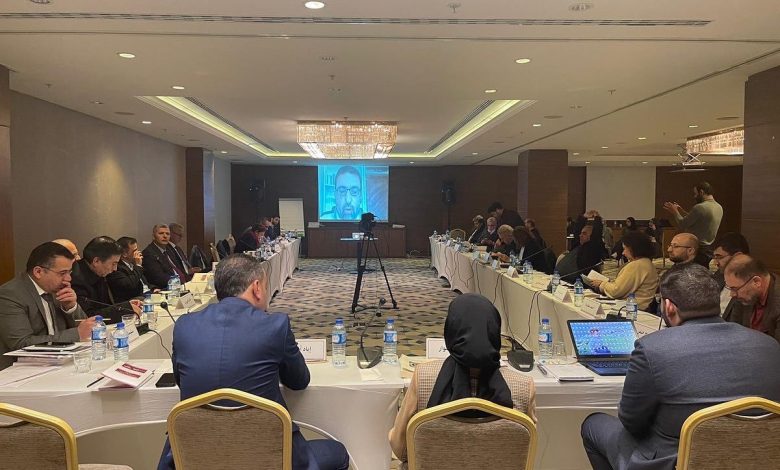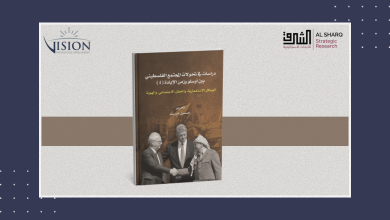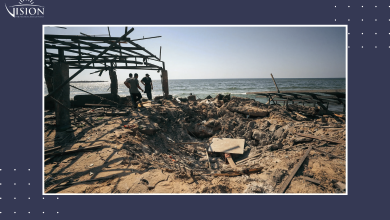Workshop on Post-Oslo Transformations on Political Actors and Palestinian Institutions

Within works on post-Oslo transformations of the Palestinian society, Vision Center, in coordination with Al-Sharq Strategic Research, held the first workshop on “Post-Oslo Transformations on Political Actors and Palestinian Institutions” on Saturday and Monday 19-20 March in Istanbul.
Ahmad Atawna, Head of Vision Center, along with Waddah Khanfar, President of Al Sharq Forum led the symposium and welcomed the audience of political experts, academicians and experts in Palestinian affairs.
Day One
The first day encompassed three seminars: Palestinian Factions and Parties’ Transformations 1, Palestinian Factions and Parties’ Transformations 2, and Non-Partisan Palestinian Actors’ Transformations.
First seminar: Palestinian Factions and Parties’ Transformations 1
The first seminar on “Palestinian Factions and Parties’ Transformations 1” was run by Hani al-Masri and included talks by Khalid al-Hroub and Adnan Abu Amer, on “Fatah Movement Post-Oslo Transformations: Attrition of Historic Symbolism and Fragile Balance”, and on “Islamic Movements Transformations in Palestinian Territories”, respectively. The seminar was concluded by a discourse presented by Hussam al-Dajani on “The Continuity of Palestinian Resistance Factions Emerged after Al-Aqsa Uprising and Its Impact on the Palestinian National Liberation Program”.
Second seminar: Palestinian Factions and Parties’ Transformations 2
The second seminar was run by Suleiman Besharat and included talks commenced by Bilal al-Shobaki on “Hamas Movement Transformations from Charter to Record and Nurture to Polarization”. Talks then resumed by Hassan Ayyoub on “Post-Oslo Transformations of Palestinian Left Parties”, before being concluded by Muhannad Mustafa’s speech on “Transformations and Practices of Palestinian Factions inside the Green Line”.
Third seminar: Non-Partisan Palestinian Actors’ Transformations
The third seminar discussed several research papers including “Palestinian Popular Unions Following Oslo Accords: Transformations of The Role and Standing” by Hamdi Hussein. The second paper was entitled “Transformations of Palestinian Elite within the Period of and After Oslo Accords: Structure, Role and Challenges” by Awni Fares. And, the third paper was on “Sociology of Israeli Systematic Change towards Palestinian Society Following Oslo Accords and Its Emerging Transformations” by Iyad Abu Zuneit.
Day Two
The second day comprised three seminars: Palestinian Civil Society Transformations, PLO and PA Transformations, and Summary of Workshop Recommendations.
First seminar: Palestinian Civil Society Transformations
The first session was run by Mohammad Affan and started with talks presented by Arin Huwari and Matanes Shehada on “Israeli Transformations and the Role of Palestinian Civil Society inside the Green Line”. Successive talks included discussions on “Palestinian Civil Society and Soft Confrontation with Palestinian Authority (PA)” by Ayman Yousef and Rola Shahwan, followed by a speech by Nihad Al-Sheikh Khalil on “Transformations of Civil Society in Gaza” which preceded a discourse by Jaber Suleiman who talked about “Post-Oslo Transformations in the Structure and Role of Palestinian Civil Society in Diaspora: Lebanon as a modal”
Second Seminar: PLO and PA Transformations
The second symposium was managed by Basheer Nafe and commenced with a speech by researcher Khalil Shahin on “The PA’s Transformations: Mandatory Track of Integration within Colonial Hegemony Regimes”. The session then was concluded with a discourse by Rashad Tawam on “The Law Game: Transformations of the PA and PLO Relation”
Third Seminar: Summary of Workshop Recommendations
The third and last colloquy of the workshop events presented a summary of the Recommendation Committee. It was run by Hassan Ubaid who led interactive talks, discussions and comments on all previous seminars, speeches and papers by many participants including Islah Jad, Basheer Nafe, Nasser Al-Din Al-Shair, and Johnny Mansour who all presented recommendations on the issues raised.





